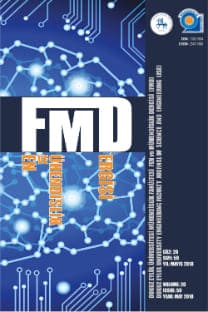Pik Turbo Orta Göbeğinin Alüminyum Alaşımından Üretilmesi
Bu araştırmanın amacı, otomobil sektöründe ağırlığı en aza indirmek için şu anda dökme demirden yapılmış bir turboşarj için alüminyum alaşımlı bir merkez muhafazası yapmaktır. Bir turboşarjın orta göbeğini üretmek için dökme demir yerine alüminyum alaşımının kullanılmasıyla, ağırlıkta yüzde 60'lık bir azalma beklenir.
Yapılan incelemede dökme demir yerine A242 alüminyum alaşımının kullanılabileceği belirlendi. A242 alüminyum alaşımlı turboşarj merkez muhafazası daha sonra ısıl işleme tabi tutuldu ve sertlik testi yapıldı. Parçanın sıcaklık dağılımı da sonlu elemanlar analizi kullanılarak incelenmiştir.
Sonuç olarak; yapılan yaşlandırma deneyinde çözeltiye alma sıcaklığı ve süresi sabit tutulmuş olup farklı sıcaklıklarda yapılan yaşlandırma ısıl işlemleri sonucunda turbo orta göbeği için en uygun yaşlandırma sıcaklığı ve süresi 190°C, 234 dakika olarak belirlenmiştir. Sıcaklık dağılım analizi sonucunda A242 alaşımından ve pik demirden üretilen turbo orta göbeğinin en sıcak noktaları, alüminyum alaşımından üretilen parçada 153°C olup dökme demir parçada ise 233°C’dir.
Anahtar Kelimeler:
Turbo Orta Göbeği, A242, Alüminyum
Production of Cast Iron Turbocharger Central Housing from Aluminum Alloy
The goal of this research is to make an aluminum alloy center housing for a turbocharger, which is currently built of cast iron, in order to minimize weight in the car sector. The use of aluminum alloy instead of cast iron to manufacture a turbocharger's central housing is expected to result in a 60 percent weight reduction.
It was determined in the investigation that A242 aluminum alloy might be utilized in place of cast iron. The turbo mid-hub, which is comprised of A242 aluminum alloy, was then heat treated and hardness tested. The finite element approach was used to examine the temperature distribution of the part.
As a result of the aging experiment, the solution temperature and duration were kept constant, and the most acceptable aging temperature and time for the turbocharger cental hausing were identified as 190°C, 234 minutes, as a consequence of the aging heat treatments done at different temperatures. The hottest spots of the turbocharger central hausing built from A242 alloy and cast iron, according to the temperature distribution study, are 153°C in the aluminum alloy section and 233°C in the cast iron component.
Keywords:
Turbo Cental Housing, A242, Aluminum,
___
- [1] ASTM B917/B917M-12(2020) Standard Practice for Heat Treatment of Aluminum-Alloy Castings From All Processes. ASTM International.
- [2] Dongming Yao, Zhihao Bai, Feng Qiu, Yanjun Li, Qichuan Jiang, 2012, Effects of La on the age hardening behavior and precipitation kinetics in the cast Al–Cu alloy, Journal of Alloys and Compounds, Volume 540, Pages 154-158, ISSN 0925-8388, https://doi.org/10.1016/j.jallcom.2012.06.089.
- [3] Weiss, DJ; Gegel, GA; Sadayappan, KS; Amer Foundry Soc, Pages 43-48, Development of Cast AI Alloys for Elevated Temperature (250C) Service, 2011, Transactions of the American Foundry Society, Volume 119
- [4] Jovid Rakhmonov, Kun Liu, Lei Pan, Francis Breton, X.-Grant Chen, 2020, Enhanced mechanical properties of high-temperature-resistant Al–Cu cast alloy by microalloying with Mg, Journal of Alloys and Compounds, Volume 827, 154305, ISSN 0925-8388, https://doi.org/10.1016/j.jallcom.2020.154305.
- [5] Davis, J. R., ed. 1998. Metals Handbook, 2nd ed. Ohio: ASM International.
- [6] Porzig, D.,Raetz H., Schwarze H., and Seume J. R., 2014. Thermal analysis of small high-speed floating-ring journal bearings. 11. International Conference on turbochargers and turbocharging, London.
- [7] M. Nemat-Alla, 2003, Reduction of thermal stresses by developing two-dimensional functionally graded materials. International Journal of Solids and Structures 40(26), 7339-7356. DOI: 10.1016/j.ijsolstr.2003.08.017
- [8] J. Gilbert Kaufman, Elwin L. 2004, Rooy Aluminum Alloy Castings: Properties, Processes, and Applications, ASM International. Materials Park, OH, USA.
- [9] ASTM E384-17 (2017) Standard Test Method for Microindentation Hardness of Materials. ASTM International.
- [10] Zheng Jing, Prediction of failure of cast iron with dynamic loading and high temperature, Materials Science and Engineering: A, Volume 566, 2013, Pages 71-81, ISSN 0921-5093, https://doi.org/10.1016/j.msea.2012.12.085.
- [11] Bruce Morey, 19.08.2014, Inside Continental's new aluminum turbocharger (Erişim Tarihi: 17.05.2022). https://www.sae.org/news/2014/08/inside-continentals-new-aluminum-turbocharger
- ISSN: 1302-9304
- Yayın Aralığı: Yılda 3 Sayı
- Başlangıç: 1999
- Yayıncı: Dokuz Eylül Üniversitesi Mühendislik Fakültesi
Sayıdaki Diğer Makaleler
Tolga AKCAN, Fatma Meltem SERDAROĞLU
Mahamane Chapiou SOULEY GARBA, Erol KAYA, Abdullah SEYRANKAYA, Fatih TURAN
Denizlerde Müsilaj Olayının Tespitine Yönelik Optik Tanımlayıcı Motifin Belirlenmesi
Müşteri Kayıplarının Tahmini Üzerine Bir Veri Madenciliği Uygulaması
Mustafa BÜYÜKKEÇECİ, Mehmet Cudi OKUR
Bir Hibrid Deve Gezgin Davranışı Algoritmasının Gezgin Satıcı Problemi için Uygulaması
Alper BAYGUT, Osman ÇULHA, Tuğçe YAĞCI
Pik Turbo Orta Göbeğinin Alüminyum Alaşımından Üretilmesi
Hibrit bir Derin Öğrenme Yöntemi Kullanarak Türkçe Cümlelerdeki Anlatım Bozukluklarının Tespiti
